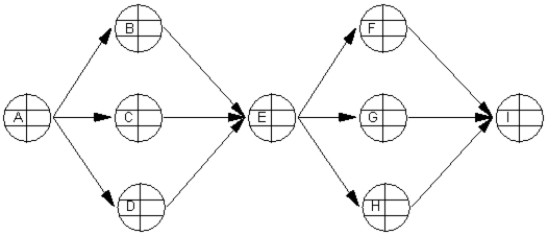Deck 15: Project Management Online
Question
Question
Question
Question
Question
Question
Question
Question
Question
Question
Question
Question
Question
Question
Question
Question
Question
Question
Question
Question
Question
Question
Question
Question
Question
Question
Question
Question
Question
Question
Question
Question
Question
Question
Question
Question
Question
Question
Question
Question
Question
Question
Question
Question
Question
Question
Question
Question
Question
Question
Question
Question
Question
Question
Question
Question
Question
Question
Question
Question
Question
Question
Question
Question
Question

Unlock Deck
Sign up to unlock the cards in this deck!
Unlock Deck
Unlock Deck
1/65
Play
Full screen (f)
Deck 15: Project Management Online
1
What are the immediate successors of activity D in this network? 
A)A,B,C
B)B,C
C)E,F
D)E

A)A,B,C
B)B,C
C)E,F
D)E
C
2
What are the immediate predecessors of activity D in this network? 
A)A,B,C
B)B,C
C)E,F
D)E,G,H

A)A,B,C
B)B,C
C)E,F
D)E,G,H
B
3
What is the earliest start time for activity D in the following diagram? 
A)3
B)4
C)6
D)7

A)3
B)4
C)6
D)7
C
4
What is the latest finish time for activity D in the following diagram? 
A)6
B)13
C)14
D)15

A)6
B)13
C)14
D)15

Unlock Deck
Unlock for access to all 65 flashcards in this deck.
Unlock Deck
k this deck
5
Activity-on-Arc AOA)networks do not allow multiple arcs with common start and finish nodes.If this must be represented,how is an AOA network modified?
A)The network is redrawn into an Activity-on-Node network.
B)Connect the arcs to the node using an IFERROR)function.
C)Phantom dummy)activity arcs are added.
D)Zero duration activity arcs are added.
A)The network is redrawn into an Activity-on-Node network.
B)Connect the arcs to the node using an IFERROR)function.
C)Phantom dummy)activity arcs are added.
D)Zero duration activity arcs are added.

Unlock Deck
Unlock for access to all 65 flashcards in this deck.
Unlock Deck
k this deck
6
What is the formula for the earliest finish time for activity i?
A)EFTi = ESTi + ti
B)EFTi = EFTj + tj
C)EFTi = EFTi−1 + ti
D)EFTi = ESTi − ti
A)EFTi = ESTi + ti
B)EFTi = EFTj + tj
C)EFTi = EFTi−1 + ti
D)EFTi = ESTi − ti

Unlock Deck
Unlock for access to all 65 flashcards in this deck.
Unlock Deck
k this deck
7
Slack for activity I is computed as
A)LFTi − ESTi
B)LSTi − ESTi
C)ESTi − LSTi
D)EFTi − LFTi
A)LFTi − ESTi
B)LSTi − ESTi
C)ESTi − LSTi
D)EFTi − LFTi

Unlock Deck
Unlock for access to all 65 flashcards in this deck.
Unlock Deck
k this deck
8
There are various similarities between the CPM and PERT methods.Which of the following is not one of those similarities?
A)Any project can be broken down into component activities that require different amounts of time.
B)Any project can be broken down into component activities that must be accomplished in a specific order.
C)Both techniques use the same method to calculate the time element of the activities in the project.
D)Both require a detailed network of the project that clearly indicates each of the main activities and the precedence relationship among the activities.
A)Any project can be broken down into component activities that require different amounts of time.
B)Any project can be broken down into component activities that must be accomplished in a specific order.
C)Both techniques use the same method to calculate the time element of the activities in the project.
D)Both require a detailed network of the project that clearly indicates each of the main activities and the precedence relationship among the activities.

Unlock Deck
Unlock for access to all 65 flashcards in this deck.
Unlock Deck
k this deck
9
Which of the following correctly describes the focus of the Program Evaluation and Review Technique PERT)?
A)To order activities in a project in terms of their completion time to facilitate scheduling of the activities.
B)To determine when a project should be completed and to schedule when each activity in the project must begin in order to keep the project on schedule.
C)To estimate the probability of completing a project by a given deadline when the time required to perform the activity is essentially a random variable.
D)To structure the activities of a project in order to eliminate or reduce critical dependencies among the activities.
A)To order activities in a project in terms of their completion time to facilitate scheduling of the activities.
B)To determine when a project should be completed and to schedule when each activity in the project must begin in order to keep the project on schedule.
C)To estimate the probability of completing a project by a given deadline when the time required to perform the activity is essentially a random variable.
D)To structure the activities of a project in order to eliminate or reduce critical dependencies among the activities.

Unlock Deck
Unlock for access to all 65 flashcards in this deck.
Unlock Deck
k this deck
10
Non-critical activities are distinguished by the presence of
A)positive slack.
B)idle resources.
C)wasted time.
D)zero slack.
A)positive slack.
B)idle resources.
C)wasted time.
D)zero slack.

Unlock Deck
Unlock for access to all 65 flashcards in this deck.
Unlock Deck
k this deck
11
The critical path is the path throughout the network.
A)longest
B)most expensive
C)shortest
D)least expensive
A)longest
B)most expensive
C)shortest
D)least expensive

Unlock Deck
Unlock for access to all 65 flashcards in this deck.
Unlock Deck
k this deck
12
How many paths are there in the following project precedence network? 
A)6
B)7
C)8
D)9

A)6
B)7
C)8
D)9

Unlock Deck
Unlock for access to all 65 flashcards in this deck.
Unlock Deck
k this deck
13
Which of the following is true regarding projects?
A)Projects can have a unique start activity and a unique finish activity.
B)Projects can have multiple start activities and a unique finish activity.
C)Projects can have multiple start and finish activities.
D)All of these are true regarding projects.
A)Projects can have a unique start activity and a unique finish activity.
B)Projects can have multiple start activities and a unique finish activity.
C)Projects can have multiple start and finish activities.
D)All of these are true regarding projects.

Unlock Deck
Unlock for access to all 65 flashcards in this deck.
Unlock Deck
k this deck
14
The term "time zero" identifies
A)the start time for each activity.
B)the start time for the project.
C)midnight on each work day.
D)days with not wasted effort.
A)the start time for each activity.
B)the start time for the project.
C)midnight on each work day.
D)days with not wasted effort.

Unlock Deck
Unlock for access to all 65 flashcards in this deck.
Unlock Deck
k this deck
15
If we are employing Activity-On-Node AON)network design,the arcs in the network diagram represent
A)significance relationships.
B)precedence relationships.
C)tasks to complete.
D)task times.
A)significance relationships.
B)precedence relationships.
C)tasks to complete.
D)task times.

Unlock Deck
Unlock for access to all 65 flashcards in this deck.
Unlock Deck
k this deck
16
Which of the following correctly describes the focus of the Critical Path Method CPM)?
A)To order activities in a project in terms of their completion time to facilitate scheduling of the activities.
B)To determine when a project should be completed and to schedule when each activity in the project must begin in order to keep the project on schedule.
C)To estimate the probability of completing a project by a given deadline when the time required to perform the activity is essentially a random variable.
D)To structure the activities of a project in order to eliminate or reduce critical dependencies among the activities.
A)To order activities in a project in terms of their completion time to facilitate scheduling of the activities.
B)To determine when a project should be completed and to schedule when each activity in the project must begin in order to keep the project on schedule.
C)To estimate the probability of completing a project by a given deadline when the time required to perform the activity is essentially a random variable.
D)To structure the activities of a project in order to eliminate or reduce critical dependencies among the activities.

Unlock Deck
Unlock for access to all 65 flashcards in this deck.
Unlock Deck
k this deck
17
Critical activities are distinguished by the presence of
A)slack.
B)idle resources.
C)wasted time.
D)zero slack.
A)slack.
B)idle resources.
C)wasted time.
D)zero slack.

Unlock Deck
Unlock for access to all 65 flashcards in this deck.
Unlock Deck
k this deck
18
If we are employing Activity-On-Arc AOA)network design,the arcs in the network diagram represent
A)significance relationships.
B)precedence relationships.
C)tasks to complete.
D)task times.
A)significance relationships.
B)precedence relationships.
C)tasks to complete.
D)task times.

Unlock Deck
Unlock for access to all 65 flashcards in this deck.
Unlock Deck
k this deck
19
The longest path through a network is comprised of the activities.
A)longest
B)essential
C)mandatory
D)critical
A)longest
B)essential
C)mandatory
D)critical

Unlock Deck
Unlock for access to all 65 flashcards in this deck.
Unlock Deck
k this deck
20
Which of the following definitions correctly defines the acronym,PERT?
A)Program Evaluation and Review Technique.
B)Process Evaluation and Review Technique.
C)Program Evaluation and Reduction Technique.
D)Program Explanation and Reduction Technique.
A)Program Evaluation and Review Technique.
B)Process Evaluation and Review Technique.
C)Program Evaluation and Reduction Technique.
D)Program Explanation and Reduction Technique.

Unlock Deck
Unlock for access to all 65 flashcards in this deck.
Unlock Deck
k this deck
21
What formula should go in cell I5 of the following spreadsheet to compute Actual Time Between Starts?

A) )
B)
C)
D) )

A) )
B)
C)
D) )

Unlock Deck
Unlock for access to all 65 flashcards in this deck.
Unlock Deck
k this deck
22
Exhibit 15.2
The following questions employ the AON network and completed spreadsheet below.

-Refer to Exhibit 15.2.What formula is placed in cell G5 to calculate the Latest Start Time?
A)H5 ? G5
B)F5 ? G5
C)H5 ? D5
D)F5 ? D5
The following questions employ the AON network and completed spreadsheet below.

-Refer to Exhibit 15.2.What formula is placed in cell G5 to calculate the Latest Start Time?
A)H5 ? G5
B)F5 ? G5
C)H5 ? D5
D)F5 ? D5

Unlock Deck
Unlock for access to all 65 flashcards in this deck.
Unlock Deck
k this deck
23
The critical path in PERT analysis is the path with the
A)smallest variance.
B)longest expected completion time.
C)smallest number of tasks.
D)smallest variance and longest expected completion time.
A)smallest variance.
B)longest expected completion time.
C)smallest number of tasks.
D)smallest variance and longest expected completion time.

Unlock Deck
Unlock for access to all 65 flashcards in this deck.
Unlock Deck
k this deck
24
Slack represents the amount of time by which an activity can be delayed without delaying the entire project,assuming that
A)all successor activities start at their earliest start times.
B)all predecessor activities start at their earliest start times.
C)immediate predecessor activities start at their earliest start times.
D)all predecessor activities start at their latest start times.
A)all successor activities start at their earliest start times.
B)all predecessor activities start at their earliest start times.
C)immediate predecessor activities start at their earliest start times.
D)all predecessor activities start at their latest start times.

Unlock Deck
Unlock for access to all 65 flashcards in this deck.
Unlock Deck
k this deck
25
Which activities have slack in the following diagram? 
A)A,C,D,F
B)B,E
C)A,C,D,E
D)B,D,E

A)A,C,D,F
B)B,E
C)A,C,D,E
D)B,D,E

Unlock Deck
Unlock for access to all 65 flashcards in this deck.
Unlock Deck
k this deck
26
One of PERT's bold assumptions is that
A)individual activity times are independent of each other.
B)individual activity times are dependent of each other.
C)individual activity times are constant.
D)individual activity times can be added together.
A)individual activity times are independent of each other.
B)individual activity times are dependent of each other.
C)individual activity times are constant.
D)individual activity times can be added together.

Unlock Deck
Unlock for access to all 65 flashcards in this deck.
Unlock Deck
k this deck
27
In a PERT network the time required to complete a path is an)
A)constant
B)random variable
C)Poisson distributed variable
D)exponentially distributed variable
A)constant
B)random variable
C)Poisson distributed variable
D)exponentially distributed variable

Unlock Deck
Unlock for access to all 65 flashcards in this deck.
Unlock Deck
k this deck
28
Which activities are critical in the following diagram? 
A)A,C,D,F
B)B,D,E
C)A,C,D,E
D)A,B,D,E,F

A)A,C,D,F
B)B,D,E
C)A,C,D,E
D)A,B,D,E,F

Unlock Deck
Unlock for access to all 65 flashcards in this deck.
Unlock Deck
k this deck
29
Shortening the activity completion time is called
A)expediting
B)speeding
C)accelerating
D)crashing
A)expediting
B)speeding
C)accelerating
D)crashing

Unlock Deck
Unlock for access to all 65 flashcards in this deck.
Unlock Deck
k this deck
30
The purpose of the forward pass in the Critical Path Method CPM)technique is to
A)review each of the precedence relationships in the activity network.
B)calculate the slack time within each node on the activity network.
C)determine the earliest time each activity can start and finish.
D)determine the latest time each activity can start and finish.
A)review each of the precedence relationships in the activity network.
B)calculate the slack time within each node on the activity network.
C)determine the earliest time each activity can start and finish.
D)determine the latest time each activity can start and finish.

Unlock Deck
Unlock for access to all 65 flashcards in this deck.
Unlock Deck
k this deck
31
Exhibit 15.1
The following questions employ the AON network and partial spreadsheet below.

-Refer to Exhibit 15.1.What array formula is placed in cell E5 to calculate the Earliest Start Time?
A)E2 + D2
B)MAXIFISERRFIND$A$5:$A$17,C5)),0,$F$5:$F$17))
C)H2 ? D2
D)MINIFISNUMBERFINDA5,$C$2:$C$8)),$G$2:$G$8))
The following questions employ the AON network and partial spreadsheet below.

-Refer to Exhibit 15.1.What array formula is placed in cell E5 to calculate the Earliest Start Time?
A)E2 + D2
B)MAXIFISERRFIND$A$5:$A$17,C5)),0,$F$5:$F$17))
C)H2 ? D2
D)MINIFISNUMBERFINDA5,$C$2:$C$8)),$G$2:$G$8))

Unlock Deck
Unlock for access to all 65 flashcards in this deck.
Unlock Deck
k this deck
32
A strength of Gantt charts is that they
A)clearly portray precedence relationships.
B)model uncertainty in activity duration times.
C)provide a timeline-based,graphical view of when activities can begin and end.
D)clearly identifies the critical path.
A)clearly portray precedence relationships.
B)model uncertainty in activity duration times.
C)provide a timeline-based,graphical view of when activities can begin and end.
D)clearly identifies the critical path.

Unlock Deck
Unlock for access to all 65 flashcards in this deck.
Unlock Deck
k this deck
33
The purpose of the backward pass in the Critical Path Method CPM)technique is to
A)review each of the precedence relationships in the activity network.
B)calculate the slack time within each node on the activity network.
C)determine the earliest time each activity can start and finish.
D)determine the latest time each activity can start and finish.
A)review each of the precedence relationships in the activity network.
B)calculate the slack time within each node on the activity network.
C)determine the earliest time each activity can start and finish.
D)determine the latest time each activity can start and finish.

Unlock Deck
Unlock for access to all 65 flashcards in this deck.
Unlock Deck
k this deck
34
A company wants to use PERT to manage a project.They have developed the following spreadsheet for the problem.If The Risk Solver Platform RSP)is used,what formula should go in cell F3 of the spreadsheet to compute the Activity Time when simulating a PERT analysis?
A)=IFE3?C3-E3)/D3-B3),D3-SQRTD3-B3)*D3-C3)*1-E3)),B3+SQRTD3-E3)*C3-B3)*E3))
B)=IFE3?D3-B3)/C3-E3),B3+SQRTD3-E3)*C3-B3)*E3),D3-SQRTD3-B3)*D3-C3)*1-E3)))
C)=IFE3?C3-E3)/D3-B3),B3-SQRTD3-E3)*C3-B3)*E3),D3+SQRTD3-B3)*D3-C3)*1-E3)))
D)=PsiTriangularB3,C3,D3)
A)=IFE3?C3-E3)/D3-B3),D3-SQRTD3-B3)*D3-C3)*1-E3)),B3+SQRTD3-E3)*C3-B3)*E3))
B)=IFE3?D3-B3)/C3-E3),B3+SQRTD3-E3)*C3-B3)*E3),D3-SQRTD3-B3)*D3-C3)*1-E3)))
C)=IFE3?C3-E3)/D3-B3),B3-SQRTD3-E3)*C3-B3)*E3),D3+SQRTD3-B3)*D3-C3)*1-E3)))
D)=PsiTriangularB3,C3,D3)

Unlock Deck
Unlock for access to all 65 flashcards in this deck.
Unlock Deck
k this deck
35
If the following project must be completed by day 18 at minimum cost how do we change the LP model?

A)Enter 18 in cell E14.
B)Add a constraint that E14 ≤ 18.
C)Make cell E14 the target cell.
D)Add a constraint that E14 = 18.

A)Enter 18 in cell E14.
B)Add a constraint that E14 ≤ 18.
C)Make cell E14 the target cell.
D)Add a constraint that E14 = 18.

Unlock Deck
Unlock for access to all 65 flashcards in this deck.
Unlock Deck
k this deck
36
Exhibit 15.2
The following questions employ the AON network and completed spreadsheet below.

-Refer to Exhibit 15.2.Which of the following activities is not on the critical path for the network?
A)Activity A
B)Activity C
C)Activity D
D)Activity G
The following questions employ the AON network and completed spreadsheet below.

-Refer to Exhibit 15.2.Which of the following activities is not on the critical path for the network?
A)Activity A
B)Activity C
C)Activity D
D)Activity G

Unlock Deck
Unlock for access to all 65 flashcards in this deck.
Unlock Deck
k this deck
37
Exhibit 15.1
The following questions employ the AON network and partial spreadsheet below.

-Refer to Exhibit 15.1.What values are placed in cell C5 of the spreadsheet?
A)E,F
B)B
C)C
D)B,C
The following questions employ the AON network and partial spreadsheet below.

-Refer to Exhibit 15.1.What values are placed in cell C5 of the spreadsheet?
A)E,F
B)B
C)C
D)B,C

Unlock Deck
Unlock for access to all 65 flashcards in this deck.
Unlock Deck
k this deck
38
A weakness of Gantt charts is that they do not explicitly
A)indicate activity times.
B)show precedence relationships.
C)show activity start times.
D)show activity finish times.
A)indicate activity times.
B)show precedence relationships.
C)show activity start times.
D)show activity finish times.

Unlock Deck
Unlock for access to all 65 flashcards in this deck.
Unlock Deck
k this deck
39
Exhibit 15.1
The following questions employ the AON network and partial spreadsheet below.

-Refer to Exhibit 15.1.What array formula is placed in cell H5 to calculate the Latest Finish Time?
A)E2 + D2
B)MAXIFISNUMBERFIND$A$2:$A$8,C5)),$F$2:$F$8))
C)H2 ? D2
D)MINIFISERRFINDA5,$C$5:$C$17)),MAX$F$5:$F$17),$G$5:$G$17))
The following questions employ the AON network and partial spreadsheet below.

-Refer to Exhibit 15.1.What array formula is placed in cell H5 to calculate the Latest Finish Time?
A)E2 + D2
B)MAXIFISNUMBERFIND$A$2:$A$8,C5)),$F$2:$F$8))
C)H2 ? D2
D)MINIFISERRFINDA5,$C$5:$C$17)),MAX$F$5:$F$17),$G$5:$G$17))

Unlock Deck
Unlock for access to all 65 flashcards in this deck.
Unlock Deck
k this deck
40
What formula should go in cell H3 of the following spreadsheet to compute Crash Cost Per Day?
A)=C3-E3)/F3-D3)
B)=F3-D3)/C3-E3)
C)=F3)/C3-E3)
D)=F3-D3)/E3)
A)=C3-E3)/F3-D3)
B)=F3-D3)/C3-E3)
C)=F3)/C3-E3)
D)=F3-D3)/E3)

Unlock Deck
Unlock for access to all 65 flashcards in this deck.
Unlock Deck
k this deck
41
A company wants to use PERT to manage a project.They have developed the following spreadsheet for the problem.What formula should go in cell F3 of the spreadsheet to compute the Activity Time when simulating a PERT analysis?

Unlock Deck
Unlock for access to all 65 flashcards in this deck.
Unlock Deck
k this deck
42
Activities with zero slack
A)are dummy activities
B)lie on the critical path
C)must be completed first
D)must be delayed
A)are dummy activities
B)lie on the critical path
C)must be completed first
D)must be delayed

Unlock Deck
Unlock for access to all 65 flashcards in this deck.
Unlock Deck
k this deck
43
Exhibit 15.4
The following questions are based on the information below.
A company needs to manage a project which consists of the following set of activities:
Activity
Days Required
Predecessor Activities
A 1 −
B 4 A
C 3 B
D 3 C
E 2 B
F 4 E
G 2 D,F
Refer to Exhibit 15.4.Manually determine the earliest and latest start and finish times for each activity and the amount of slack for each activity.What is the critical path for the project and how long should it take to complete it?
The following questions are based on the information below.
A company needs to manage a project which consists of the following set of activities:
Activity
Days Required
Predecessor Activities
A 1 −
B 4 A
C 3 B
D 3 C
E 2 B
F 4 E
G 2 D,F
Refer to Exhibit 15.4.Manually determine the earliest and latest start and finish times for each activity and the amount of slack for each activity.What is the critical path for the project and how long should it take to complete it?

Unlock Deck
Unlock for access to all 65 flashcards in this deck.
Unlock Deck
k this deck
44
Exhibit 15.3
The following questions are based on the information below.
A company needs to manage a project which consists of the following set of activities:

Refer to Exhibit 15.3.The following spreadsheet was developed to determine the earliest start times and latest start times for the project.Based on the data in the spreadsheet,which activities are on the critical path?

The following questions are based on the information below.
A company needs to manage a project which consists of the following set of activities:

Refer to Exhibit 15.3.The following spreadsheet was developed to determine the earliest start times and latest start times for the project.Based on the data in the spreadsheet,which activities are on the critical path?


Unlock Deck
Unlock for access to all 65 flashcards in this deck.
Unlock Deck
k this deck
45
Exhibit 15.6
The following questions use the information below.
Consider the CPM network for the following set off activities: Activity Predecessor Activities
 A ---
A ---
B A
C A,B
D A,B
E A,B,C
F A,B,C
G A,B,C,D
H A,B,D
I A,B,C,D,F,G
Refer to Exhibit 15.6.Is it necessary to draw an arc from the node for activity F to the node for activity I?
The following questions use the information below.
Consider the CPM network for the following set off activities: Activity Predecessor Activities
 A ---
A ---B A
C A,B
D A,B
E A,B,C
F A,B,C
G A,B,C,D
H A,B,D
I A,B,C,D,F,G
Refer to Exhibit 15.6.Is it necessary to draw an arc from the node for activity F to the node for activity I?

Unlock Deck
Unlock for access to all 65 flashcards in this deck.
Unlock Deck
k this deck
46
For an activity with duration t,slack can be calculated as
A)LS-ES
B)LF-t
C)LS+t
D)LS+ES
A)LS-ES
B)LF-t
C)LS+t
D)LS+ES

Unlock Deck
Unlock for access to all 65 flashcards in this deck.
Unlock Deck
k this deck
47
Exhibit 15.3
The following questions are based on the information below.
A company needs to manage a project which consists of the following set of activities:

Refer to Exhibit 15.3.Identify each path through the network and its expected length.
The following questions are based on the information below.
A company needs to manage a project which consists of the following set of activities:

Refer to Exhibit 15.3.Identify each path through the network and its expected length.

Unlock Deck
Unlock for access to all 65 flashcards in this deck.
Unlock Deck
k this deck
48
Exhibit 15.4
The following questions are based on the information below.
A company needs to manage a project which consists of the following set of activities:
Activity
Days Required
Predecessor Activities
A 1 −
B 4 A
C 3 B
D 3 C
E 2 B
F 4 E
G 2 D,F
Refer to Exhibit 15.4.Identify each path through the network and its expected length.
The following questions are based on the information below.
A company needs to manage a project which consists of the following set of activities:
Activity
Days Required
Predecessor Activities
A 1 −
B 4 A
C 3 B
D 3 C
E 2 B
F 4 E
G 2 D,F
Refer to Exhibit 15.4.Identify each path through the network and its expected length.

Unlock Deck
Unlock for access to all 65 flashcards in this deck.
Unlock Deck
k this deck
49
Exhibit 15.5
The following questions use the information below.
A company wants to crash a project and reduce the time required to complete it.They have developed the following table of activity costs and times and a spreadsheet to compute starting time for each activity.


Refer to Exhibit 15.5.What formula should go in cell H3 of the Costs spreadsheet to compute Crash Cost Per Day?
The following questions use the information below.
A company wants to crash a project and reduce the time required to complete it.They have developed the following table of activity costs and times and a spreadsheet to compute starting time for each activity.


Refer to Exhibit 15.5.What formula should go in cell H3 of the Costs spreadsheet to compute Crash Cost Per Day?

Unlock Deck
Unlock for access to all 65 flashcards in this deck.
Unlock Deck
k this deck
50
Exhibit 15.4
The following questions are based on the information below.
A company needs to manage a project which consists of the following set of activities:
Activity
Days Required
Predecessor Activities
A 1 −
B 4 A
C 3 B
D 3 C
E 2 B
F 4 E
G 2 D,F
Refer to Exhibit 15.4.Draw the CPM network for this problem.Use AON notation.
The following questions are based on the information below.
A company needs to manage a project which consists of the following set of activities:
Activity
Days Required
Predecessor Activities
A 1 −
B 4 A
C 3 B
D 3 C
E 2 B
F 4 E
G 2 D,F
Refer to Exhibit 15.4.Draw the CPM network for this problem.Use AON notation.

Unlock Deck
Unlock for access to all 65 flashcards in this deck.
Unlock Deck
k this deck
51
Exhibit 15.5
The following questions use the information below.
A company wants to crash a project and reduce the time required to complete it.They have developed the following table of activity costs and times and a spreadsheet to compute starting time for each activity.


Refer to Exhibit 15.5.What formula should go in cell I5 of the Model spreadsheet to compute Actual Time Between Starts?
The following questions use the information below.
A company wants to crash a project and reduce the time required to complete it.They have developed the following table of activity costs and times and a spreadsheet to compute starting time for each activity.


Refer to Exhibit 15.5.What formula should go in cell I5 of the Model spreadsheet to compute Actual Time Between Starts?

Unlock Deck
Unlock for access to all 65 flashcards in this deck.
Unlock Deck
k this deck
52
Exhibit 15.3
The following questions are based on the information below.
A company needs to manage a project which consists of the following set of activities:

Refer to Exhibit 15.3.Draw the CPM network for this problem.Use AON notation.
The following questions are based on the information below.
A company needs to manage a project which consists of the following set of activities:

Refer to Exhibit 15.3.Draw the CPM network for this problem.Use AON notation.

Unlock Deck
Unlock for access to all 65 flashcards in this deck.
Unlock Deck
k this deck
53
In project control charts,the horizontal bars are shaded to indicate
A)work completed
B)work to be completed
C)overcapacity
D)undercapacity
A)work completed
B)work to be completed
C)overcapacity
D)undercapacity

Unlock Deck
Unlock for access to all 65 flashcards in this deck.
Unlock Deck
k this deck
54
Exhibit 15.6
The following questions use the information below.
Consider the CPM network for the following set off activities: Activity Predecessor Activities
 A ---
A ---
B A
C A,B
D A,B
E A,B,C
F A,B,C
G A,B,C,D
H A,B,D
I A,B,C,D,F,G
Refer to Exhibit 15.6.Is it necessary to draw an arc from the node for activity A to the node for activity C?
The following questions use the information below.
Consider the CPM network for the following set off activities: Activity Predecessor Activities
 A ---
A ---B A
C A,B
D A,B
E A,B,C
F A,B,C
G A,B,C,D
H A,B,D
I A,B,C,D,F,G
Refer to Exhibit 15.6.Is it necessary to draw an arc from the node for activity A to the node for activity C?

Unlock Deck
Unlock for access to all 65 flashcards in this deck.
Unlock Deck
k this deck
55
Exhibit 15.3
The following questions are based on the information below.
A company needs to manage a project which consists of the following set of activities:

Refer to Exhibit 15.3.Manually determine the earliest and latest start and finish times for each activity and the amount of slack for each activity.What is the critical path for the project and how long should it take to complete it?
The following questions are based on the information below.
A company needs to manage a project which consists of the following set of activities:

Refer to Exhibit 15.3.Manually determine the earliest and latest start and finish times for each activity and the amount of slack for each activity.What is the critical path for the project and how long should it take to complete it?

Unlock Deck
Unlock for access to all 65 flashcards in this deck.
Unlock Deck
k this deck
56
Exhibit 15.5
The following questions use the information below.
A company wants to crash a project and reduce the time required to complete it.They have developed the following table of activity costs and times and a spreadsheet to compute starting time for each activity.


Refer to Exhibit 15.5.If the following project must be completed by day 18 at minimum cost how do we change the LP model?
The following questions use the information below.
A company wants to crash a project and reduce the time required to complete it.They have developed the following table of activity costs and times and a spreadsheet to compute starting time for each activity.


Refer to Exhibit 15.5.If the following project must be completed by day 18 at minimum cost how do we change the LP model?

Unlock Deck
Unlock for access to all 65 flashcards in this deck.
Unlock Deck
k this deck
57
A project plan is established
A)before project activities begin and is modified as time goes on and conditions change
B)before project activities begin
C)before project organization
D)dynamically,as conditions change
A)before project activities begin and is modified as time goes on and conditions change
B)before project activities begin
C)before project organization
D)dynamically,as conditions change

Unlock Deck
Unlock for access to all 65 flashcards in this deck.
Unlock Deck
k this deck
58
For an activity with duration t,slack can be calculated as
A)LF-EF
B)LF-t
C)LS+t
D)LS+ES
A)LF-EF
B)LF-t
C)LS+t
D)LS+ES

Unlock Deck
Unlock for access to all 65 flashcards in this deck.
Unlock Deck
k this deck
59
An activity
A)is an effort required to complete part of the project
B)is a milestone
C)consumes no resources
D)describes precedence relationship
A)is an effort required to complete part of the project
B)is a milestone
C)consumes no resources
D)describes precedence relationship

Unlock Deck
Unlock for access to all 65 flashcards in this deck.
Unlock Deck
k this deck
60
Exhibit 15.4
The following questions are based on the information below.
A company needs to manage a project which consists of the following set of activities:
Activity
Days Required
Predecessor Activities
A 1 −
B 4 A
C 3 B
D 3 C
E 2 B
F 4 E
G 2 D,F
Refer to Exhibit 15.4.The following spreadsheet was developed to determine the earliest start times and latest start times for the project.Based on the data in the spreadsheet,which activities are on the critical path?

The following questions are based on the information below.
A company needs to manage a project which consists of the following set of activities:
Activity
Days Required
Predecessor Activities
A 1 −
B 4 A
C 3 B
D 3 C
E 2 B
F 4 E
G 2 D,F
Refer to Exhibit 15.4.The following spreadsheet was developed to determine the earliest start times and latest start times for the project.Based on the data in the spreadsheet,which activities are on the critical path?


Unlock Deck
Unlock for access to all 65 flashcards in this deck.
Unlock Deck
k this deck
61
In CPM,the duration of the project
A)is equal to the duration of the critical path
B)is determined by managers
C)is determined by investors
D)is determined by a supervising government agency
A)is equal to the duration of the critical path
B)is determined by managers
C)is determined by investors
D)is determined by a supervising government agency

Unlock Deck
Unlock for access to all 65 flashcards in this deck.
Unlock Deck
k this deck
62
The main difference between CPM and PERT is that
A)PERT is probabilistic
B)PERT is deterministic
C)CPM is best for longer projects
D)CPM requires 3 duration estimates for each activity
A)PERT is probabilistic
B)PERT is deterministic
C)CPM is best for longer projects
D)CPM requires 3 duration estimates for each activity

Unlock Deck
Unlock for access to all 65 flashcards in this deck.
Unlock Deck
k this deck
63
A way to crash an activity is to
A)spend extra money
B)subcontract
C)use overtime
D)all of the above
A)spend extra money
B)subcontract
C)use overtime
D)all of the above

Unlock Deck
Unlock for access to all 65 flashcards in this deck.
Unlock Deck
k this deck
64
In deciding which activities to crash,select
A)activities on the critical paths)
B)all activities with positive slack time
C)longest activities
D)lowest cost activities
A)activities on the critical paths)
B)all activities with positive slack time
C)longest activities
D)lowest cost activities

Unlock Deck
Unlock for access to all 65 flashcards in this deck.
Unlock Deck
k this deck
65
CPM and PERT differ because of
A)activity time estimates
B)cost calculations
C)precedence relationship
D)network diagram
A)activity time estimates
B)cost calculations
C)precedence relationship
D)network diagram

Unlock Deck
Unlock for access to all 65 flashcards in this deck.
Unlock Deck
k this deck



